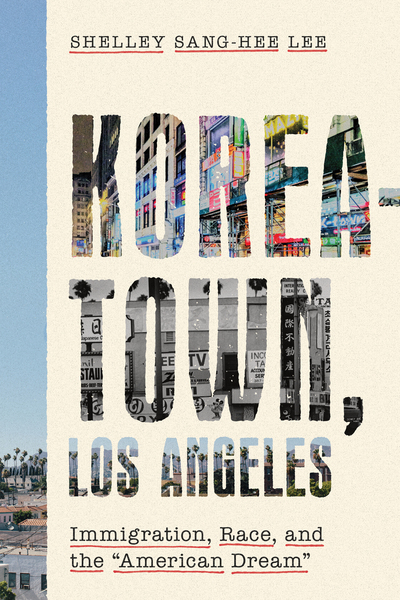
June 2022
216 pages.
from $26.00
Paperback now $13.00 (50% off)
Hardcover ISBN: 9781503613737
Paperback ISBN: 9781503631823
Ebook ISBN: 9781503631830
The story of how one ethnic neighborhood came to signify a shared Korean American identity.
At the turn of the twenty-first century, Los Angeles County's Korean population stood at about 186,000—the largest concentration of Koreans outside of Asia. Most of this growth took place following the passage of the Hart-Celler Act of 1965, which dramatically altered US immigration policy and ushered in a new era of mass immigration, particularly from Asia and Latin America. By the 1970s, Korean immigrants were seeking to turn the area around Olympic Boulevard near downtown Los Angeles into a full-fledged "Koreatown," and over the following decades, they continued to build a community in LA.
As Korean immigrants seized the opportunity to purchase inexpensive commercial and residential property and transformed the area to serve their community's needs, other minority communities in nearby South LA—notably Black and Latino working-class communities—faced increasing segregation, urban poverty, and displacement. Beginning with the early development of LA's Koreatown and culminating with the 1992 Los Angeles riots and their aftermath, Shelley Sang-Hee Lee demonstrates how Korean Americans' lives were shaped by patterns of racial segregation and urban poverty, and legacies of anti-Asian racism and orientalism.
Koreatown, Los Angeles tells the story of an American ethnic community often equated with socioeconomic achievement and assimilation, but whose experiences as racial minorities and immigrant outsiders illuminate key economic and cultural developments in the United States since 1965. Lee argues that building Koreatown was an urgent objective for Korean immigrants and US-born Koreans eager to carve out a spatial niche within Los Angeles to serve as an economic and social anchor for their growing community. More than a dot on a map, Koreatown holds profound emotional significance for Korean immigrants across the nation as a symbol of their shared bonds and place in American society.
About the author
Shelley Sang-Hee Lee is Professor of American Studies at Brown University.
"Koreatown, Los Angeles is an important work that brings together multiple histories—of Korean America, Los Angeles, the United States, interracial and interethnic relations, and immigration, among others—to examine Korean Los Angeles and Korean America since the 1970s. A compelling and accessibly written read."
—Arissa Oh, Boston College
"Meticulously researched and crisply written, Koreatown, Los Angeles is a richly layered chronicle of K-town's history: the ethnic, migrant, economic, and global politics that helped put the multiracial enclave on the map, lit the match that burned it down, and helped it rise from the ashes."
—Nadia Y. Kim, Loyola Marymount University
"This is a fascinating story exploring the emergence, destruction, and rebuilding of LA's Koreatown and the immigrants who shaped its development. A deep dive into the complexity of race, immigration, class, power, and the 'American Dream' in the largest Korean enclave outside of Korea."
—Do Kim, The K.W. Lee Center for Leadership
"Koreatown, Los Angeles is rich, detailed, and a must-read for anyone interested in learning more about the largest Korean population settlement outside of Korea."
—Michael Haan, Ethnic and Racial Studies
"Lee raises interesting questions about the evolution of Koreatown by bringing economic restructuring and intraethnic and interracial relations into the discussion. I was particularly intrigued by how Black-Korean relations have shaped LA from the mid-1960s to the early 1990s."
—Jinwon Kim, Social Forces
"Koreatown, Los Angeles provides a well-written, concise, easily accessible narrative of the creation of the Korean enclave. It also provides an excellent description of how the great demographic changes that many U.S. cities experienced in the 1970s and '80s played out within the economic shifts engendered by deindustrialization, globalization, and neoliberalism that reshaped the American urban landscape during the period. This work is a valuable contribution to recent Los Angeles history, understandings of immigration and ethic enclave development, and Korean American and Asian American studies."
—Elwing Suong Gonzalez, California History
"Koreatown, Los Angeles is a welcoming book on the Los Angeles Korean American community, the largest diasporic Korean community outside of Korea. It is refreshing to see historical scholarship covering the Korean American community, which has been studied mostly by social scientists, in particular sociologists. This book demonstrates exemplary historical analysis and craftmanship. More importantly, perhaps it is the first monograph examining Koreatown, Los Angeles as a research object."
—Kyeyoung Park, Pacific Affairs
"Koreatown, Los Angeles thoroughly demonstrates how Korean Americans have become powerful place-makers in Los Angeles. Lee provides a rich historical account of the community and neighborhood that centers Korean American experiences and perspectives, while also providing important critiques about how urban policies have shaped the livelihood and sense of belonging among Asian American and immigrant communities."
—Laureen D. Hom, Contemporary Sociology